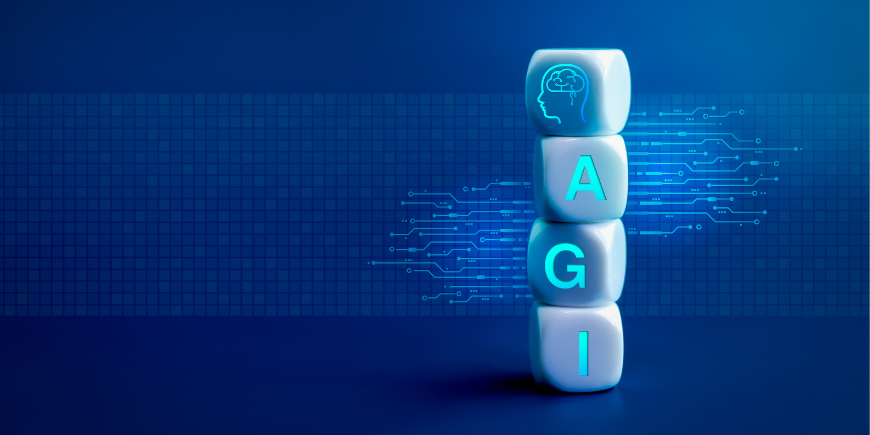A giant leap for artificial intelligence with general AI. What it is and the economic impact it will have.
The world is constantly changing, but technological change is far from over. Artificial intelligence is preparing to take an extraordinary step forward: according to recent analyses, General Artificial Intelligence (AGI) could be a reality as early as 2026.
This advance would represent a true revolution, introducing a system capable of thinking, learning and adapting autonomously, just like a human being, and marking a crucial moment in the history of technology.
A goal that is becoming more concrete
An analysis of numerous predictions made by experts, scientists and entrepreneurs has revealed a significant shift in perspective regarding the arrival of General Artificial Intelligence (AGI). In the past, it was thought that this technology could see the light of day between 2040 and 2060. However, recent technological advances have shifted this prediction towards a more immediate realisation.
In recent years, AGI has moved closer to becoming a tangible reality with the development of advanced language models.
Until recently, the scientific community was unsure whether it would be possible to create an artificial intelligence capable of reasoning as autonomously and versatilely as a human being. Today, however, some experts believe that this goal is not only achievable, but also closer than previously thought.
But what is general artificial intelligence?
One of the key elements accelerating progress towards General Artificial Intelligence (AGI) is the rapid increase in computing power. The exponential growth in computing power is allowing artificial intelligence models to reach ever higher levels of sophistication. Quantum computing could also play a crucial role, offering new opportunities to overcome the limitations of current technologies.
Despite these advances, not all experts agree that AGI is that close. Some believe that today’s technologies, which are mainly based on advanced language models, are not sufficient to create intelligence that is truly comparable to human intelligence.
Bridging the gap between current capabilities and those required for a full AGI is likely to require the development of new technologies and innovative approaches. Unlike existing artificial intelligences, which are designed to perform specific tasks such as speech recognition or autonomous driving, the AGI would be able to perform a wide range of cognitive tasks with the same flexibility as a human.
Today we use specialised AI, which is advanced but limited in its ability to adapt to new situations without specific reprogramming. An AGI system, on the other hand, could learn autonomously, reason creatively and solve novel problems without human intervention.
Although the concept of AGI has been discussed for decades, it is only now that advances in neural networks and machine learning are bringing it closer to reality. Currently, AI systems are capable of answering questions, generating content and supporting complex conversations, but further developments, such as more advanced long-term memory and continuous learning capabilities, will be needed to achieve true general intelligence. Whether AGI becomes a reality in 2026 or in the more distant future, it is clear that it will be one of the most significant technological revolutions in history, with profound implications for every aspect of society.
Fears and looking to the future
The advent of General Artificial Intelligence (AGI) presents a mix of extraordinary opportunities and complex challenges. On the one hand, AGI could profoundly transform sectors such as medicine, education and business, providing innovative solutions to complex problems and improving the quality of life. On the other hand, there are concerns about safety, ethics and the impact on the labour market. Among the main concerns is the risk that AGI will escape human control and make decisions that are unpredictable or even contrary to the interests of society. This raises sensitive ethical issues, such as the responsibility of intelligent machines, and underlines the importance of precise regulation to avoid potentially dangerous scenarios.
Another key issue is the impact of AGI on the world of work. If machines are able to perform complex and creative tasks, many jobs could be replaced, with significant consequences for unemployment and social inequalities. To mitigate these effects, it will be essential to invest in retraining programmes and to redefine education systems to adapt them to the needs of a changing market.
AGI also raises profound questions about the very concept of intelligence and consciousness. If machines were to achieve a level of thinking comparable or superior to that of humans, our relationship with technology and the role of humans in the world could be radically transformed. This could trigger a cultural and philosophical revolution of unprecedented proportions.
When and if general artificial intelligence becomes a reality, it will be a turning point in human history. The key challenge will be to ensure that this new technology is developed and used safely and responsibly, bringing tangible benefits to society without compromising core values.
Economic impacts
AGI has the potential to revolutionise the global economy in a number of ways:
- Increased productivity: By automating complex processes, AGI could improve efficiency in sectors such as healthcare, logistics and scientific research.
- Accelerated innovation: Through its ability to learn and adapt, AGI could drive the development of new technologies and solutions, thereby stimulating economic growth.
- Impact on the workforce: While some jobs may be replaced, others may be upgraded or created, requiring new skills and training.
- Economic disparities: The adoption of AGI could widen the technology gap between regions and companies, increasing competition for resources and talent.
In conclusion, the advent of General Artificial Intelligence (AGI) could have a profound impact on the global economy, radically transforming labour markets, productive sectors and financial dynamics. But there is a risk that, if not properly regulated, it will exacerbate inequalities and create instability.


